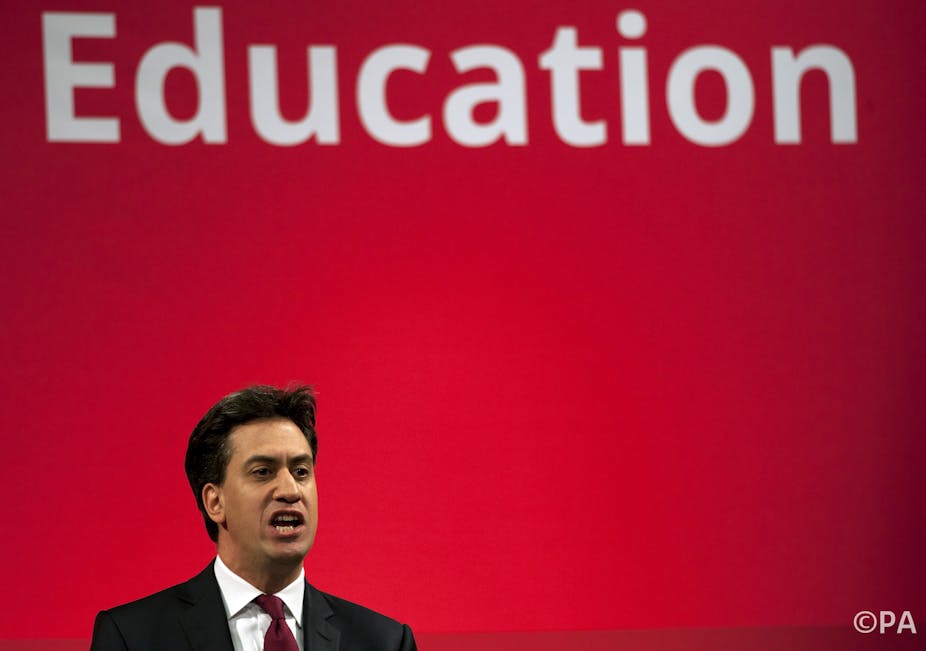The Labour leader, Ed Miliband, has finally announced details of the party’s long-awaited policy to reduce tuition fees should his party win the election. He said:
From September of next year, the next Labour government will reduce tuition fees from £9,000 to £6,000 meeting our obligations to the next generation. It will benefit those starting courses next year. It will benefit those already at university. The average reduction in the debt will be around £9,000 per student, higher for courses longer than three years. And the national debt, the burden on taxpayers will be cut by £40bn by 2030.
Most of the politicians, civil servants, and analysts who are bickering over how to fund university tuition fees also benefited from free tuition themselves.
When I was an undergraduate at the University College Hospital Medical School back in the early 1970s, my fellow students and I often worried about making ends meet, just like today’s students. Some received additional means-tested financial support and many of us worked in the holidays. But we did not have to find the cash for our tuition fees.
I know why things have changed. It’s obvious. A larger proportion of young people now receive a university education than was the case in my day. A little under 50% of 17 to 30-year-olds attend university nowadays – compared to about 5% of us when I was an undergraduate. In some other OECD countries the proportion in higher education is even higher.
Right now no one seems entirely sure how we are to continue to pay for that. And this worries me. Are we seriously going to tell youngsters that we have turned the clock back – and only a tiny percentage of them deserve tertiary education – just because those in power cannot agree on a sustainable funding solution? I certainly hope not.
Status quo not sustainable
I can see there is a question about how many graduates we actually need and how many graduate level jobs are available. My answer to that is that we live in a world of global competition for work. We simply cannot afford to have a badly educated workforce in which only a tiny elite of Britons are graduates. Indeed many of our graduates create new enterprises and generate jobs for others.
Proof, if any were needed, of how our overseas economic competitors prize tertiary education, lies in the number of overseas students who come to Britain to study. According to the latest data released by the Office of National Statistics, there were 192,000 people immigrating to the UK to study in the year to September 2014 – students who pay higher fees than our home students do. It is also evident that the emerging, rapidly growing economies in the world are investing heavily in higher education and research, building new universities and racking up spending on science. They know that the future is a knowledge-based economy.
At Sussex, around a third of our 14,000 students come from more than 120 different countries. Unlike some in the present government, we consider our international students to be honoured guests, not immigrants. Britain’s university sector is one of the jewels of our national economic crown and consistently one of our biggest export industries.
Fee cut will hit outreach

Before we end up cutting tuition fees without a credible plan for filling the gap we should also remember where this cash is going. Tuition fees are already a maximum of £6,000 – which is the figure Labour has proposed to cut them to – unless a university can prove that it is investing generous amounts of cash in attracting students from disadvantaged backgrounds and is supporting them when they get here.
We spend huge amounts on outreach initiatives in schools in Sussex, London and beyond, on bursaries, careers assistance and work placements for the students once they arrive. This is social mobility in action – and it’s producing tangible results.
As vice chancellor, I don’t pay lip service to widening participation. Each of the UK’s 160 universities has to produce detailed and fully-costed plans for how we are going to attract and support students from underrepresented communities. We submit new plans annually to the Office of Fair Access before we receive permission to charge £9,000 per annum.
I can see that the existing tuition fee system is vilified as a bottomless pit of debt for students or a giant bill for tax payers and I can see why. But I do not believe all the arguments stack up. It is absurd to imagine that a huge number of graduates will never earn above the £21,000 a year repayment threshold in the decades after they graduate. Wages have already started to creep up and student loan repayments have sped up too.
Why not a graduate tax?
With a modicum of effort the existing system could be modified into a graduate tax. It need be no more complicated to collect than income tax or national insurance. We all have to pay tax on our earnings. Why can’t it be done through the tax code? Yes some graduates might flee overseas – but some do anyway. It is easy to exaggerate that danger.
This is the moment for the UK to invest in universities and all political parties seriously positioning themselves for a role in government should make their plans clear and costed before the general election. My dream is of a day when any student who is willing and able can come to university – absolutely regardless of background or wealth. I think the universities are doing their bit. My hope is that the politicians will do theirs.

